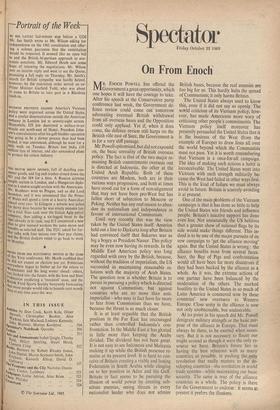On From Enoch
MR. ENOCH POWELL has offered the Government a great opportunity, which one hopes it will have the courage to take. After his speech at the Conservative party conference last week, the Government de- fence review could come out tomorrow advocating eventual British withdrawal from all overseas bases and the Opposition could only applaud. Yet if, when it does come, the defence review still harps on the British role east of Suez, the Government is in for a very stiff passage. Mr. Powell epitomised, but did not expound on, the basic unreality of British overseas policy. The fact is that of the two major re- maining British commitments overseas one is directed at Indonesia, the other at the United Arab Republic.. Both of these countries are Moslem, both are in their various ways progressive, and both at times have stood out for a form of non-alignment that may not have been pro-West but has fallen short of subjection to Moscow or Peking. Neither has any real reason to aban- don its nationalism and independence in favour of international Communism.
Until very recently this was the view taken by the United States itself. America held out a line to Djakarta long after Britain had convinced itself that Sukarno was as big a bogey as President Nasser. This policy may be even now having its rewards. In the Middle East American policy was long regarded with envy by the British, because, without the tradition of imperialism, the US succeeded in maintaining reasonable re- lations with the majority of Arab, States. The question now is' whether Britain is to persist in pursuing a policy which is directed• not against Communism, but against countries who are no more than anti- imperialist—who may in fact have far more to fear from Communism than we have, because the threat is so much closer.
It is at least arguable that the British position in the Far East has encouraged rather than controlled Indonesia's con- frontation. In the Middle East it has gloried in little more than keeping the Arabs divided. The dividend has not been great. It is not easy to see Indonesia and Malaysia making it up while the British presence re- mains at its present level. It is hard to con- ceive of Britain creating a viable and lasting Federation in South Arabia while clinging on to her position in Aden and the Gulf. Britain in fact seems to be pursuing the illusion of world power by creating sub- stitute enemies, seeing threats in every nationalist leader who does not admire British bases, because the real enemies .are too big for us. This hardly halts the spread of Communism; it only harms Britain.
The United States always 'used to know this, even if it did not say so openly. The world criticism of its Vietnam policy, how- ever, has made Americans more wary of criticising other people's commitments. The Vietnam policy itself moreover has presently persuaded the United States that it is the business of the West (from the example of Europe) to draw lines all over the world beyond which the Communists must not pass. Yet it is worth remembering that Vietnam is a once-for-all campaign. The idea of making such actions a habit is inconceivable. The United States went into Vietnam with such strength militarily be- cause the West had failed in other ways first. This is the kind of failure we must always avoid in future. Britain is scarcely avoiding it at present.
One of the main problems of the Vietnam campaign is that it has done so little to help the United States win friends and influence people. Britain's inactive support has done even less. Not unnaturally the US belieVes that .a greater show of national flags by its side would make things different. This in- deed is to be one of the major pursuits of its new campaign to 'get the alliance moving' again. But the United States is wrong : the alliance benefits most from several faces. Suez, the Bay of Pigs and confrontation would all have been far more disastrous if they had been backed by the alliance as a whole. As it was, the extreme actions of one partner have been balanced by the moderation of the others. The marked hostility to the United States in so much of Latin America is countered now by these countries' new overtures to Western Europe. Close unity in the alliance is now not only unobtainable, but undesirable. At no point in his speech did Mr. Powell denigrate military strength or the basic pur- pose of the alliance in Europe. That must always be there, to be exerted when neces- sary. But it is not necessary to flaunt our might around as though it were the only re- source we have. Britain's future lies in having the best relations with as many countries as possible, in pushing the only revolution that really mattehs to the de- veloping countries—the revolution in world trade systems—while maintaining our basic security. The same is true of the alliance countries as a whole. The policy is there for the Government to endorse : it seems at present it prefers the illusions.






























 Previous page
Previous page